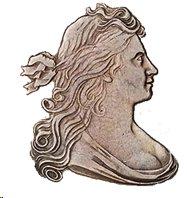
PREV ARTICLE
NEXT ARTICLE
FULL ISSUE
PREV FULL ISSUE
R.W. JULIAN ON THE MODEL FOR DRAPED BUST COINAGE
R.W. Julian submitted this note on the model for Draped Bust coinage.
-Editor
This wonderful portrait done by Stuart was in all probability the contemporary image used by assistant engraver John Eckstein for the "two models for dollars", with Anne Bingham's features (BB-51 and BB-52) that he prepared the dies (probably including the small eagle motif seen on the reverse), for which he was paid $30 on September 9, 1795, by Mint Director Henry DeSaussure. There are some problems with this paragraph, as follows: 1) John Eckstein was never an engraver, assistant or otherwise, at the United States Mint. 2) Eckstein did not engrave any dies for United States coinage. 3) The “models” made by Eckstein in September 1795 were actually plaster models for the use of Robert Scot, who did engrave the hubs and dies for this coinage. The use of plasters by engravers was common in the 18th and 19th centuries. 4) Because the Willing family were prominent Federalists, the chances of Anne Willing Bingham's portrait having been used for the coinage are slight at best. President Washington was under attack from the anti-Federalists and the use of a recognizable portrait on the coinage would have caused him additional political problems.
To read the earlier E-Sylum article, see:
MORE ON THE MODEL FOR DRAPED BUST COINAGE
(www.coinbooks.org/esylum_v13n14a12.html)
The Numismatic Bibliomania Society is a non-profit organization promoting numismatic literature. See our web site at coinbooks.org. To submit items for publication in The E-Sylum, write to the Editor at this address: whomren@gmail.com To subscribe go to: https://my.binhost.com/lists/listinfo/esylum All Rights Reserved. NBS Home Page Contact the NBS webmaster 
|
 In the April 4, 2010, issue of the E-Sylum Karl Moulton has the following to say about the genesis of the Draped Bust dollar coinage in the late summer of 1795:
In the April 4, 2010, issue of the E-Sylum Karl Moulton has the following to say about the genesis of the Draped Bust dollar coinage in the late summer of 1795: